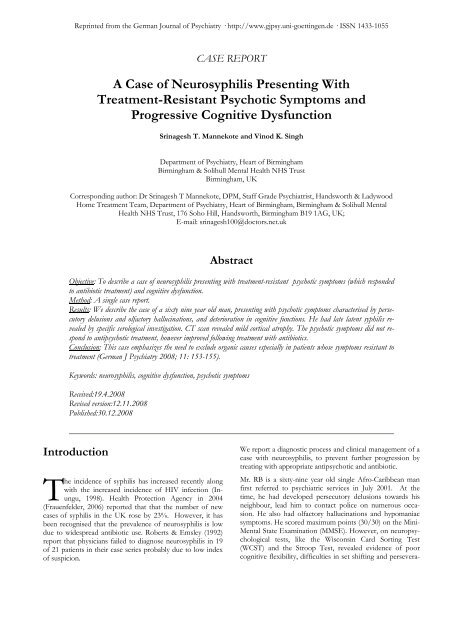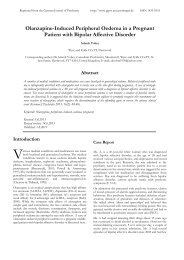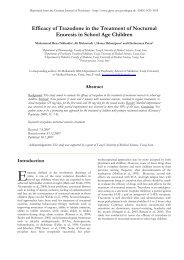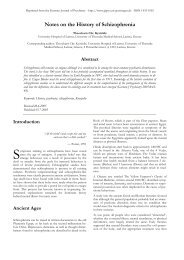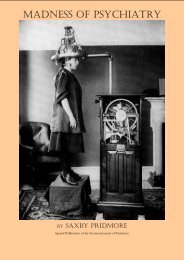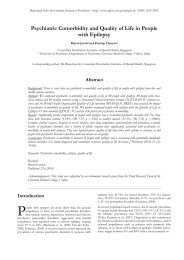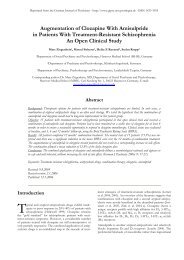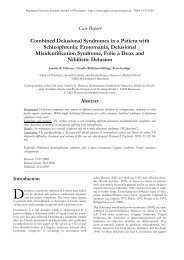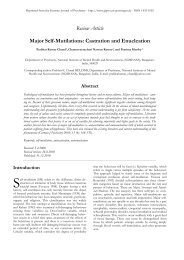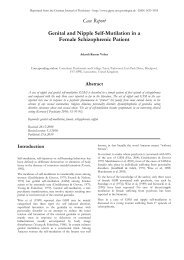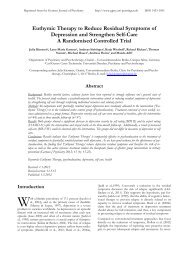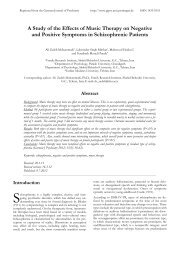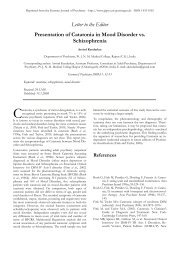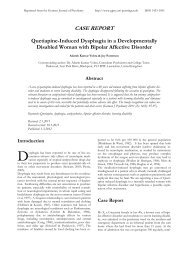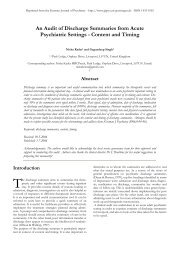A Case of Neurosyphilis Presenting With Treatment-Resistant ...
A Case of Neurosyphilis Presenting With Treatment-Resistant ...
A Case of Neurosyphilis Presenting With Treatment-Resistant ...
You also want an ePaper? Increase the reach of your titles
YUMPU automatically turns print PDFs into web optimized ePapers that Google loves.
Reprinted from the German Journal <strong>of</strong> Psychiatry · http://www.gjpsy.uni-goettingen.de · ISSN 1433-1055<br />
CASE REPORT<br />
A <strong>Case</strong> <strong>of</strong> <strong>Neurosyphilis</strong> <strong>Presenting</strong> <strong>With</strong><br />
<strong>Treatment</strong>-<strong>Resistant</strong> Psychotic Symptoms and<br />
Progressive Cognitive Dysfunction<br />
Srinagesh T. Mannekote and Vinod K. Singh<br />
Department <strong>of</strong> Psychiatry, Heart <strong>of</strong> Birmingham<br />
Birmingham & Solihull Mental Health NHS Trust<br />
Birmingham, UK<br />
Corresponding author: Dr Srinagesh T Mannekote, DPM, Staff Grade Psychiatrist, Handsworth & Ladywood<br />
Home <strong>Treatment</strong> Team, Department <strong>of</strong> Psychiatry, Heart <strong>of</strong> Birmingham, Birmingham & Solihull Mental<br />
Health NHS Trust, 176 Soho Hill, Handsworth, Birmingham B19 1AG, UK;<br />
E-mail: srinagesh100@doctors.net.uk<br />
Abstract<br />
Objective: To describe a case <strong>of</strong> neurosyphilis presenting with treatment-resistant psychotic symptoms (which responded<br />
to antibiotic treatment) and cognitive dysfunction.<br />
Method: A single case report.<br />
Results: We describe the case <strong>of</strong> a sixty nine year old man, presenting with psychotic symptoms characterised by persecutory<br />
delusions and olfactory hallucinations, and deterioration in cognitive functions. He had late latent syphilis revealed<br />
by specific serological investigation. CT scan revealed mild cortical atrophy. The psychotic symptoms did not respond<br />
to antipsychotic treatment, however improved following treatment with antibiotics.<br />
Conclusion: This case emphasizes the need to exclude organic causes especially in patients whose symptoms resistant to<br />
treatment (German J Psychiatry 2008; 11: 153-155).<br />
Keywords: neurosyphilis, cognitive dysfunction, psychotic symptoms<br />
Received:19.4.2008<br />
Revised version:12.11.2008<br />
Published:30.12.2008<br />
Introduction<br />
T<br />
he incidence <strong>of</strong> syphilis has increased recently along<br />
with the increased incidence <strong>of</strong> HIV infection (Inungu,<br />
1998). Health Protection Agency in 2004<br />
(Frauenfelder, 2006) reported that that the number <strong>of</strong> new<br />
cases <strong>of</strong> syphilis in the UK rose by 23%. However, it has<br />
been recognised that the prevalence <strong>of</strong> neurosyphilis is low<br />
due to widespread antibiotic use. Roberts & Emsley (1992)<br />
report that physicians failed to diagnose neurosyphilis in 19<br />
<strong>of</strong> 21 patients in their case series probably due to low index<br />
<strong>of</strong> suspicion.<br />
We report a diagnostic process and clinical management <strong>of</strong> a<br />
case with neurosyphilis, to prevent further progression by<br />
treating with appropriate antipsychotic and antibiotic.<br />
Mr. RB is a sixty-nine year old single Afro-Caribbean man<br />
first referred to psychiatric services in July 2001. At the<br />
time, he had developed persecutory delusions towards his<br />
neighbour, lead him to contact police on numerous occasion.<br />
He also had olfactory hallucinations and hypomaniac<br />
symptoms. He scored maximum points (30/30) on the Mini-<br />
Mental State Examination (MMSE). However, on neuropsychological<br />
tests, like the Wisconsin Card Sorting Test<br />
(WCST) and the Stroop Test, revealed evidence <strong>of</strong> poor<br />
cognitive flexibility, difficulties in set shifting and persevera-
MANNEKOTE & SINGH<br />
tion. Impairment <strong>of</strong> immediate and delayed recall was evident<br />
in both verbal and visual modalities.<br />
In view <strong>of</strong> an extensive history <strong>of</strong> sexual contacts, he was<br />
investigated for sexually transmitted diseases. His serological<br />
tests for neurosyphilis, like VDRL and syphilis Ig by ELISA<br />
were positive. The TPPA (Treponema pallidum particle<br />
agglutination assay) was positive with a titre <strong>of</strong> 1:20480. His<br />
EEG, CT scan, lever function tests, thyroid function test,<br />
vitamin B12 and folic acid levels were normal. Thus, a diagnosis<br />
<strong>of</strong> late latent syphilis was made. The patient was<br />
treated with benzathine penicillin; unfortunately, he did not<br />
complete the recommended course. His hypomaniac symptoms<br />
subsided with carbamazepine. However, psychotic<br />
symptoms did not respond to antipsychotic treatment. Since<br />
2003 he was tried on several antipsychotics by the community<br />
mental health team, which included trifluperazine, olanzapine,<br />
risperidone, aripiprazole, flupenthixol and quetiapine,<br />
without any success.<br />
In May 2007, he presented with new symptoms <strong>of</strong> being<br />
agitated. His confusion was associated with significant deterioration<br />
in cognitive functions. In addition, he continued to<br />
have olfactory hallucinations and paranoid delusions. His<br />
cognitive function had deteriorated gradually over the previous<br />
3 to 4 years, with a rapid deterioration in the three<br />
months preceding the referral. On the Mini-Mental State<br />
Examination (MMSE), he scored 22 out <strong>of</strong> 30, loosing<br />
points in orientation to time and place, as well as in recall <strong>of</strong><br />
three objects. Neuropsychological tests were not performed<br />
due to doubts about his ability to co-operate with lengthy<br />
cognitive assessments.<br />
The physical examination revealed visual impairment (due to<br />
band keratopathy caused by chronic uveitis) and corneal<br />
degeneration. He had stooped posture and slowness <strong>of</strong><br />
movements. No other neurological signs were present.<br />
In view <strong>of</strong> the previous history <strong>of</strong> syphilis and deterioration<br />
<strong>of</strong> cognitive functions, he was re-referred to the genitourinary<br />
medicine clinic for a review. The genito-urinary<br />
medicine team were <strong>of</strong> the impression that he had symptoms<br />
suggestive <strong>of</strong> neurosyphilis and further investigations, including<br />
a lumbar puncture, were planned. However, Mr. RB<br />
refused the lumbar puncture. His repeat haematological,<br />
liver function tests, thyroid function test, vitamin B12 and<br />
folic acid were normal. ELISA for IgG, VDRL and TPPA<br />
(titre <strong>of</strong> 1:10240) were positive for syphilis. A CT scan revealed<br />
mild cortical atrophy.<br />
Mr. RB commenced on a 28-day course <strong>of</strong> doxycycline<br />
200mg twice daily taken orally. In addition, treatment with<br />
the antipsychotics flupenthixol 12mg and quetiapine 250mg<br />
was continued. A significant improvement in his paranoid<br />
delusions and olfactory hallucinations was observed within 2<br />
to 3 weeks commencing treatment with doxycycline. There<br />
was no major improvement in his cognitive functions; however,<br />
there were no further episodes <strong>of</strong> confusion.<br />
Discussion<br />
<strong>Neurosyphilis</strong> can occur at any stage <strong>of</strong> the syphilitic disease.<br />
Symptomatic neurosyphilis has a variable presentation <strong>of</strong><br />
neurological syndromes, due to the infection <strong>of</strong> the central<br />
nervous system or endarteritis by Treponema pallidum (UK<br />
national guidelines, 2002). The most common manifestations<br />
<strong>of</strong> symptomatic neurosyphilis are Tabes dorsalis and general<br />
paralysis <strong>of</strong> the insane.<br />
Psychiatric symptoms are well known from the time when<br />
neurosyphilis was first discovered. Kraft-Ebbing first reported<br />
that general paresis can present with neurosyphilis<br />
(Hutto, 2001). Generally, it starts with non-specific symptoms<br />
<strong>of</strong> personality change and amnesia but gradually, it can<br />
present with mood changes, psychotic symptoms and worsening<br />
<strong>of</strong> cognitive functions, associated with more crippling<br />
paralytic symptoms during later stages <strong>of</strong> the disease (Hutto,<br />
2001). In fact, it can present with any kind <strong>of</strong> psychiatric<br />
symptoms.<br />
The classical manifestation <strong>of</strong> neurosyphilis is not observed<br />
frequently at present. A number <strong>of</strong> reasons have been suggested,<br />
including the extensive use <strong>of</strong> antibiotics, partial<br />
treatment <strong>of</strong> the infection and co-infection with other sexually<br />
transmitted diseases. For example, it has been established<br />
that faster evolution <strong>of</strong> late syphilis occurs in HIV<br />
positive patients, with enhanced surveillance revealing that<br />
more than a third <strong>of</strong> patients with syphilis are infected with<br />
HIV (Frauenfelder, 2006). In our patient, it is likely that this<br />
manifestation (<strong>of</strong> neurosyphilis) was due to partial treatment<br />
with penicillin. Ideally, CSF examination should be performed<br />
to confirm or refute the diagnosis <strong>of</strong> neurosyphilis.<br />
However, our patient refused to undergo lumbar puncture<br />
for CSF treponemal test. The CT scan in our patient revealed<br />
cortical atrophy, which was in keeping with published<br />
literature (Holland,1986; Pavitharan,1993 and Gürses, 2007).<br />
Psychiatric symptoms improved with addition <strong>of</strong> antibiotic<br />
therapy to his antipsychotic medication, similar to the case<br />
series by Sanchez (2007).<br />
This case report emphasizes the need to have a high index <strong>of</strong><br />
suspicion <strong>of</strong> neurosyphilis in patients with significant past<br />
sexual history, presenting with psychiatric symptoms, especially<br />
when resistant to antipsychotic treatment.<br />
Acknowledgements: Dr Muttu Kumar Kannabiran DPM.<br />
MRCPsych, Specialist Registrar, Dr Sudhir Kumar CT, MD.<br />
MRCPSych, Consultant Psychiatrist, Dr Vijayakumar Harbishettar,<br />
Staff grade Psychiatrist, Mrs Petranella Ward,<br />
Manager<br />
References<br />
Frauenfelder C. Incidence <strong>of</strong> syphilis in UK rises as HIV<br />
diagnoses hold steady. British Medical Journal<br />
2006;333:1089.<br />
154
NEUROSYPHILIS<br />
Gürses C, Bilgic B, Topcular B, Tuncer OG, Akman-Demir<br />
G, Hanagasi H, Baslo B, Gurvit H, Coban O, Emre<br />
m. Idrisoğlu HA. Clinical and Magnetic Resonance<br />
imaging findings <strong>of</strong> HIV-negative patients with <strong>Neurosyphilis</strong>.<br />
Journal <strong>of</strong> Neurology, 2007; 254(3) 368-<br />
74.<br />
Holland BA, Perret LV, Mills CM. Meningovascular syphilis:<br />
CT and MR findings. Radiology 1986;158:439-42.<br />
Hutto B. Syphilis in clinical psychiatry: A review Psychosomatics<br />
2001 42:6 453-60.<br />
Inungu J, Morse A, Gordon C. Nerosyphilis during the<br />
AIDS epidemic, New Orleans 1990-1997 The journal<br />
<strong>of</strong> Infectious Disease 1998, 178: 1229-1232.<br />
Pavithran K. Computer tomographic findings in neurosyphilis,<br />
IJDVL 1993; 59 : 122-124.<br />
Roberts MC, Emsley RA. Psychiatric manifestations <strong>of</strong> <strong>Neurosyphilis</strong>.<br />
S Afr Med J 1992; 82:335-337<br />
Sanchez FM, Ziesseiman MH. <strong>Treatment</strong> <strong>of</strong> psychiatric<br />
symptoms associated with neurosyphilis. Psychosomatics<br />
2007 48:5 440-50.<br />
UK National Guidelines for management <strong>of</strong> late syphilis<br />
published-1999, revised 2002<br />
The German Journal <strong>of</strong> Psychiatry · ISSN 1433-1055 · http:/www. gjpsy.uni-goettingen.de<br />
Dept. <strong>of</strong> Psychiatry, The University <strong>of</strong> Göttingen, von-Siebold-Str. 5, D-37075 Germany; tel. ++49-551-396607; fax:<br />
++49-551-398952; E-mail: gjpsy@gwdg.de<br />
155


